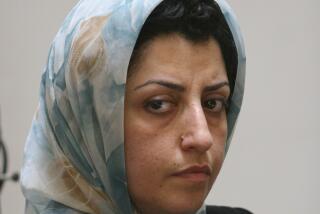Khatami Seeks Reprise of Reform Ideas in Iran
- Share via
TEHRAN — Iranian President Mohammad Khatami announced Friday his bid for reelection, despite the popular reformer’s own reluctance and mounting pressure from Islamic hard-liners who have thwarted his programs, shut down institutions that support him and punished many of his allies.
With just two days left before the deadline to file, the soft-spoken cleric turned an administrative formality into a powerful political event. After filling out the requisite paperwork, Khatami gave a short, tear-filled speech at the Interior Ministry laying out both his anxieties and his commitment to the nation’s Islam-based democracy.
“Four years ago I came with clear ideas. I have had some successes, but a heavy price has been paid for our success,” he said in what was for him an uncharacteristically emotional address. “Many people were hurt and many people are in a compromised position.”
Though it is widely expected that the 58-year-old president will handily win a second term, the June 8 election is viewed by many here as a watershed for the Islamic Republic. Khatami’s efforts to institute political and social reforms have been blocked by conservatives as anathema to the 1979 revolution. Now both sides will be watching the vote to see if Khatami can win an overwhelming mandate and the political capital needed to shepherd through at least some of his ideas.
“Personally, I would prefer to be somewhere else,” Khatami said Friday, twice wiping tears from his eyes as he spoke. “I thought about whether I could be at the service of the country and the people by being president or by taking up another job. But the reason I decided to run was that I saw the public call for my taking a second term, and a person in my position has to give priority to the people’s desires.”
Khatami was a relatively unknown cleric in 1997 when he ran as the reform candidate, hardly a threat to the nation’s conservative religious leadership, which was squarely behind its own nominee. But Khatami tapped into a wellspring of frustration with the slow pace of change in society and captured 70% of the vote. His victory was followed last year with reform candidates taking control of the parliament, or Majlis.
But the euphoria in the reform camp was short-lived, with control of this nation of nearly 70 million people staying squarely in the hands of the religious leadership. Supreme leader Ayatollah Ali Khamenei has the last word on most matters.
Over the years many of Khatami’s aides, advisors and friends have been forced from office, barred from running or jailed. Dozens of newspapers that supported his agenda have been shut down. Last month, 42 members of Iran’s main opposition group, the Freedom Movement, were arrested on charges of trying to overthrow the Islamic establishment.
Khatami’s announcement drew criticism from conservatives, who said his last-minute bid was a tactic intended to stir up popular emotions. But other observers said it was based on a real inner conflict, though in the end it probably did work to his political benefit.
“He had serious doubts and was weighing the pluses and minuses; it wasn’t an election ploy,” said Hadi Semati, professor of political science at Tehran University. “But it did end up confusing the other side.”
Moderate conservatives have said they would like to see Khatami retain his office--so long as he remains politically weak--because he brings the country credibility abroad.
Some Iranians reacted with wary relief. Hearing of Khatami’s decision on the radio outside a local market, university student Shirine Safavi wasn’t surprised. “I never doubted that he’d run,” she said. “I suppose it’s positive, because among the candidates he’s the best. At least we won’t regress.”
At least 187 candidates have registered to run for president. Nominations must be approved by the 12-member Guardian Council, which also has the power to veto laws. The council is due to announce the results of its deliberations by May 18. Campaigning begins the next day.
Times staff writer Slackman reported from Cairo and special correspondent Moaveni from Tehran.
More to Read
Sign up for Essential California
The most important California stories and recommendations in your inbox every morning.
You may occasionally receive promotional content from the Los Angeles Times.













